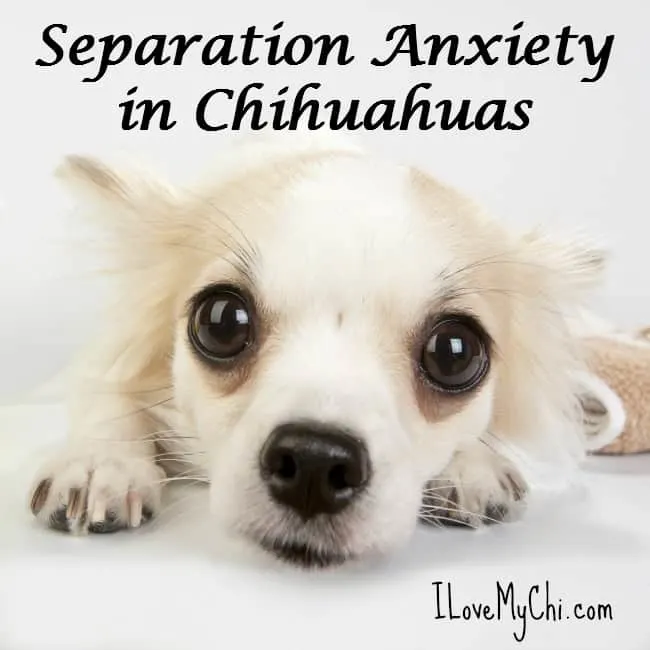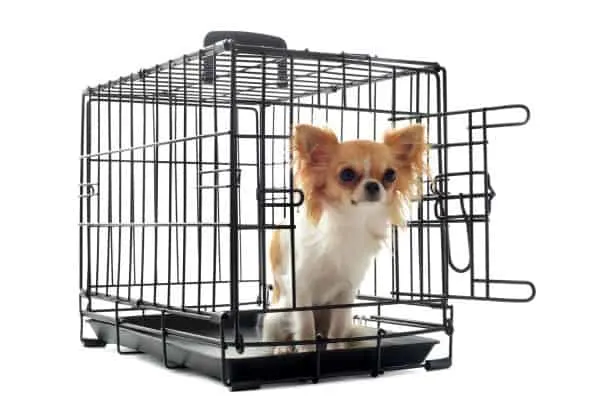
As pet lovers, we might think that it’s adorable when our dogs bark or whine as we walk out the door. It’s great that your pint-sized pup always wants to be by your side, isn’t it?
Well, though many of us may think that a clingy Chihuahua is charming, experiencing separation anxiety is no picnic from your pup’s point of view. Our little dogs are highly social little companions, even more so than many other breeds, and it’s pretty typical for them to feel anxious when they’re separated from their family.
Unfortunately, an overly attached Chi can often become quite distressed when they’re left alone, and this can lead to a multitude of behavior problems that can make life uncomfortable for both you and your pooch.
What does separation anxiety look like in your pet? Just as every dog is unique, so are their different ways of expressing extreme anxiety. Chihuahuas with this condition might howl, bark, destroy household items, claw at doors or windows, try to escape, and pee and poop inappropriately in the house while their owners are away. Some pups refuse to eat or drink, or can even become so upset that they can harm themselves as well!
It’s important to know that our canine companions aren’t doing this out of spite, boredom, or poor training, however – they are just truly so distressed that they need to find an outlet for their extreme emotions while they’re separated from us.
It’s also been found that dogs that have had a less than ideal start in life are also more likely to develop separation anxiety. Chihuahuas that have been adopted from shelters, puppy mills, and pet stores, or those who have lived in multiple homes are at a higher risk for becoming over-attached and distressed about departures.
How can we reduce the effect that alone time can have on our Chihuahuas? Many owners are upset by their pet’s misery, of course, but have no idea how to even begin to help their pups.
Here are some ways that you can help your Chihuahua to become more independent in order to relax when they can’t be with you.
First, it’s important to teach your Chi to accept your comings and goings as normal and unexciting. Downplay your departures and arrivals from home, avoiding prolonged ‘goodbyes’ when you leave and grandiose greetings when you return, and take your leave quickly and quietly without fuss.
It’s also a good idea to have a special treat or chew that you only give to your furry friend when you’re away so that they begin to look forward to your parting as a positive event. If your pup starts showing signs of nervousness during certain steps of your normal routine before you leave (like putting on your coat, for example), practice doing this step over and over without actually leaving the house, and reward your Chihuahua when they stay calm.
Next, it’s time to increase your pup’s sense of independence. Although many of us love the close relationship that we share with our petite Chis, it’s healthier for them to feel confident and safe spending some time away from you. Ignore excessive attention-seeking behavior from your Chihuahua, and reward them for calm behavior in your presence instead, like sitting calmly or lying down.

It’s also essential for your dog to get used to being separated from you while you’re home from time to time, too. If your Chihuahua is used to a crate or pen
, then provide them with an opportunity for some alone time, along with a good chew toy or food puzzle
when you’re busy in another room.
Never force your Chi to stay in a crate if they become anxious or nervous in one, however, since this can make their anxiety worse. You can also teach your Chihuahua a ‘go to bed’ or ‘mat’ command, rewarding them for learning to relax in place for gradually longer periods away from you instead of constantly following you around.
You might be interested to know that positive obedience training sessions (like learning fun tricks) can also help build your pup’s confidence, too, and are a great way to maintain the close bond that you have with your dog. Keep in mind that you should never, ever punish your Chihuahua for their ‘bad’ behavior that stems from separation anxiety – not only will they not link the punishment with any mess that they make, but doing this can make them even more worried, which is obviously not the goal you’re striving for!
Finally, remember that your Chihuahua will probably benefit from an increase in exercise, too. The old adage ‘a tired dog is a happy dog’ holds some truth, and it’s possible that your pup won’t feel like expending excess energy due to anxiety if they’re tired from a busy play date or an exciting trip to the park. Chihuahuas have busy minds and bodies, and need lots of mental and physical activity to remain happy and healthy.
Although the suggestions above can often help a dog with mild to moderate separation anxiety, for some Chihuahuas, their distress reaches a point that can actually prove dangerous. Our tiny canine companions can often cause significant damage to themselves or their homes because of their anxiety.
If your four-legged friend is extremely upset by your absence or seems to be getting worse, the best option to help them may be to seek the help of a veterinary behaviorist. A professional can actually help your Chi more effectively by tailoring a treatment plan to your situation, teaching you how you can gently and properly condition your petite pet to being left alone over time.

In some severe cases of separation anxiety, medication may also be needed; it can decrease your dog’s sense of terror and panic as you work on your training program with them.
Although dealing with your Chihuahua’s separation anxiety might be annoying or frustrating, remember that the feeling is far worse for your pup. The process of treating this condition is one that takes time, patience, and positivity on your part, but with the right guidance, your small furry family member can learn that being away from you is truly not as bad as it seems.
Do you have this problem with your Chihuahua? What have you done to help them? Leave a comment below and let us know what has worked for you or what issues you are still dealing with.
&

Sandra Smith
Wednesday 30th of October 2024
Our chihuahua Liam had anxiety when we left him. We taught him a phrase. Watch the house. Every time we leave we say this and now he knows that when we say watch the house we are coming back. This helps a lot because it doesn’t matter where we are. We just say the phrase and he knows we are coming back. If we are going on long trips we take him with us. We don’t leave him with others. He is 15 now and that is too hard for him. Love him. He is wonderful.
Cathy Bendzunas
Wednesday 30th of October 2024
That's a good idea. I always tell my dogs "I'll be back" but I still have the feeling they think I'm never coming home.
Wednesday 15th of May 2024
Your information and suggestions are great for anxiety for my pup.
But. Can u suggest what would be good for “Car Sickness”?
Cathy Bendzunas
Wednesday 15th of May 2024
One thing to do is not give your dog food for about 2-3 hours before you get in the car. And you can give them CBD oil to calm them down.
Nina
Wednesday 10th of January 2024
I have a 11 yr old Apple head full blooded chi and came to my husband n me when she was 11 weeks old Being my husband was disabled he was mostly home when I went out to the stores etc. When we both went out we had other dogs her to keep her company.My husband passed away 3 yrs ago n due to financial problems I can just afford her.Though she always was n is my dog since my husband passed she has been more “clingy “ then ever. Thankfully my best friend has 2 toy poodles when she comes over leaves them here n we going out shopping. I hate leaving her alone she grow up always having someone in the house when I went out .I am 76 yrs old and can’t bring myself to leave her alone n wish I could bring her with me to more places ..Now with my husband deceased she is my day to day support and everything.Is it to late to make her feel not so stressed out if I have to leave for awhile alone?
Cathy Bendzunas
Wednesday 10th of January 2024
One thing you can do is to see about getting her certified as a support animal, then you can take her to more places. You can get more info about that in this article: https://ilovemychi.com/what-to-know-about-emotional-support-animals/ Also, just like I told Melody in previous comment (in case you didn't see it), give her one of your unwashed shirts that you have recently worn. The smell of you on it will comfort her. And you can try a ThunderShirt. That helps some dogs. CBD oil is good for calming them down too. I got several of my pet sitting clients to give it to their dogs that had separation anxiety issues. If all else fails, ask your vet for a mild tranquilizer to give her on the days you have to leave her alone.
Melody
Tuesday 9th of January 2024
My Chihuahua, Rondo. Barks alot when I leave him He has separation anxiety.I could use some ways that works for them,I live in an elderly building, so I could really use some helpful advice.he is very quiet and loveable otherwise.
Cathy Bendzunas
Tuesday 9th of January 2024
One thing you can do it to leave a shirt that you have recently worn but hasn't been washed yet in her bed or wherever she likes to hang out so she can smell your scent. Consult with a veterinarian about medication or supplements that may help reduce anxiety. Some dogs benefit from prescription medications or natural supplements like CBD. Consider using calming aids such as pheromone diffusers, calming sprays, or calming vests like the ThunderShirt to help your Chihuahua feel more relaxed.
Donna
Wednesday 13th of December 2023
I adopted a 2yr chihuahua from a shelter 8 months ago, she will not come to me or let me hold her she hides when any comes in the house, how can I make her feel more comfortable, I don't think she ever had human contact, the home were she came from had 50 other dogs in one room, the shelter said it was tarable.
Cathy Bendzunas
Wednesday 13th of December 2023
It may take awhile so be patient with her. I'm sure she has trust issues coming from the background she came from. Is she food motivated at all? If so, take a high value treat, something she wouldn't normally get but loves, and just set it in your hand or your lap while watching tv or just chilling out. Let her eat it if she comes to get it and just talk quietly and sweetly to her as she does it. Do this for a few weeks to show her that being close to you is a good thing. After awhile, you may be able to get her to sit in your lap.